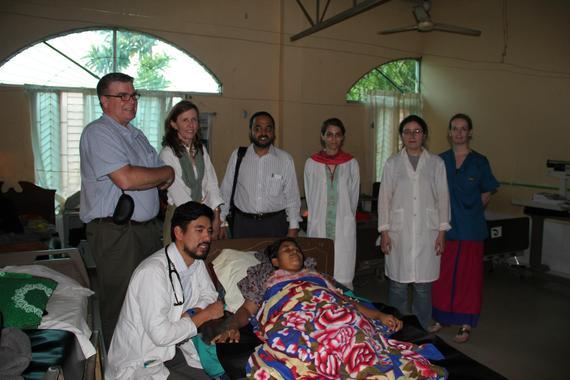Scottish nurse, Pauline Cafferkey, continues to fight for her health in Royal Free Hospital in London, as the Ebola virus ravages her body. Infected while serving as a volunteer nurse for Save the Children in Sierra Leone, Cafferkey has been hospitalized for more than two weeks. Thankfully, the Hospital reports her condition is improving and she's been taken off the critical list. This is, of course, great news for Ms. Cafferkey and her loved ones, with all hoping that she will fully recover soon.
I met Ms. Cafferkey a little over two years ago in Bangladesh, at the Hope Hospital for Women and Children in Cox's Bazar, not far from the Myanmar border. Cafferkey was there, volunteering three months of her life, to bring the priceless gift of health to this underserved community generally, and women suffering from the childbirth injury obstetric fistula, specifically. She is remembered admiringly by the team in Bangladesh for her extraordinary dedication.
When I heard she had been in Sierra Leone working to save the lives of Ebola patients, I was not surprised. In the last decade, I've had the pleasure of meeting many doctors and nurses in developing countries treating women with obstetric fistula, an injury that produces incontinence, and frequently shame. Until these women are cured they are far too often neglected and abandoned, treated, in the words of Nicholas Kristof of the New York Times, as 'modern day lepers.' I'm continually struck by what these medical professionals have in common: selfless commitment to caring for these horribly injured and marginalized women.
I've traveled to many countries in Africa and Asia -- some with majority Muslim populations, such as Pakistan, or Bangladesh, where I met Cafferkey, and to majority Christian countries, such as Kenya or Uganda. And, here's the thing: I see the same tireless commitment in medical staff. Similarly, international meetings focused on fistula attract medical professionals from every corner of the developing world of all theological stripes; their faith, or lack of it, is insignificant. What draws them together is the desire to help incontinent women, hurt simply for trying to bring a child into the world, get their lives back.
And so, last week, as I sat like so many of us riveted, by the tragic scenes from Paris, I thought about my colleagues who so often work together across theological differences, united by shared purpose rather than divided by faith. I feel lucky, to know these 'better angels' -- motivated by a force more powerful than hate: love.
For, what drives someone to provide care to indigent incontinent women, or to the gravely ill, infected by a lethal and highly contagious virus -- if not love?
As I type this I have John Lennon's voice in my head:
Imagine there's no countries... Imagine all the people living life in peace... Imagine all the people sharing all the world... You may say I'm a dreamer... But I'm not the only one... I hope someday you'll join us... And the world will live as one...
Here's a picture to go with that verse. It's taken in the fistula ward Hope Hospital in Bangladesh, in November 2012. Can you tell who in this picture is a Christian Missionary? A devout Muslim? A searching Agnostic? An American? A Russian? A Bangladeshi? A Saudi? Does it matter? I'd argue, no. But, for the record, Pauline Cafferkey, that steadfast and courageous Scottish nurse, is on the far right; I have no idea about her faith. What I do know is that I'm delighted she's getting better, because this world is a much more loving place because of exceptional people like Pauline.
Kate Grant is CEO of Fistula Foundation, which works in 29 countries to treat women who suffer from the childbirth injury obstetric fistula. Follow the organization at @Fistula_Fdtn.

